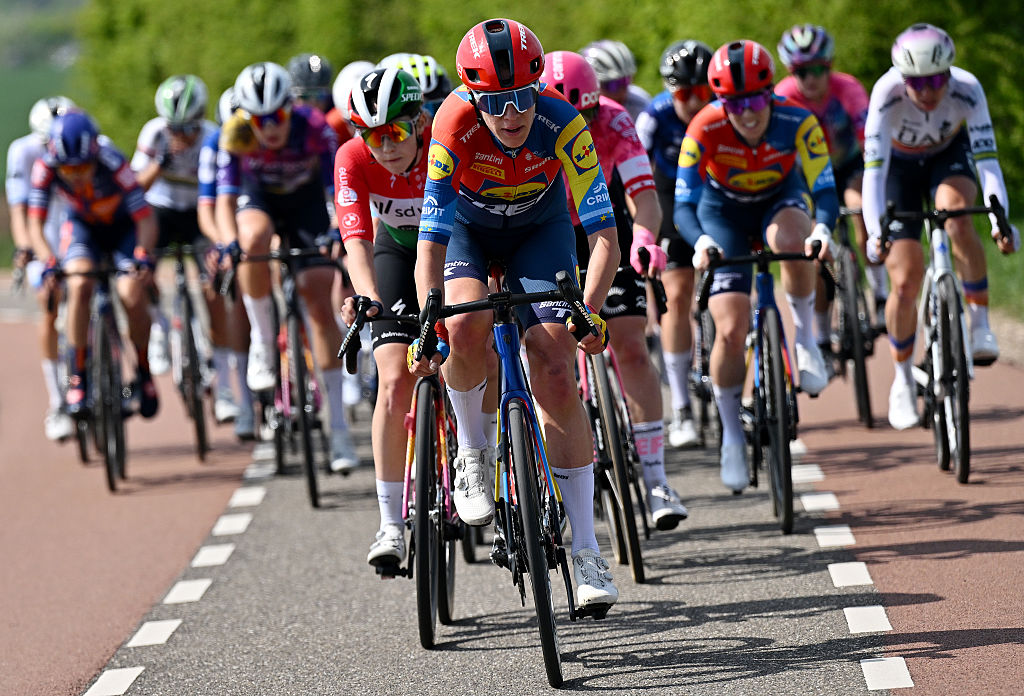
The women’s Amstel Gold Race has a penchant for throwing up surprise results, and this year's race, won by Mischa Bredewold (SD Worx-Protime), was reminiscent of the 2018 edition when a strong breakaway finished well ahead of a peloton full of pre-race favourites.
This time around, Bredewold secured a solo victory, finishing just a handful of seconds ahead of a group of four: Ellen van Dijk (Lidl-Trek), Puck Pieterse (Fenix-Deceuninck) and Juliette Labous (FDJ-Suez).
While they are all capable of winning on any given day, the outcome came as a surprise because none of the anticipated outright favourites at the start of the day ended up in a position to win.
Many expected riders such as Demi Vollering (FDJ-SUEZ), Elisa Longo Borghini (UAE Team ADQ) and Marianne Vos (Visma-Lease a Bike), among others, to be among those fighting for victory, but a strong group of 23 riders got away with more than 55km to go without them, and they were no longer in contention.
The fact that Vollering had suffered a crash early in the race also played a role in how things unfolded. The former winner of the Amstel Gold Race had hit the deck a little over 40km into the race and was happy to let her teammate Juliette Labous race for the win instead.
“They crashed ahead of me, and since it was downhill, you have no chance [to avoid them], really,” Vollering told Dutch website In De Leiderstrui
“It was a good situation for us with Juliette Labous in the front group. And after my crash, you don’t know exactly how you react to that, so it was fine,” said Vollering.
Vos also ended up ‘trapped’ in the peloton behind a strong breakaway with two of her teammates, Marion Bunel and Femke de Vries. The 37-year-old veteran noted that with most teams represented up front, there was little interest in really chasing the group down.
“A really big group with good riders got away. And since all teams were there, they had a really good chance,” said Vos to local Dutch broadcaster L1 after her 22nd-place finish.
“We had two in that group as well, and then you have to gamble a little bit on that and see how it goes. We tried to stay in the race as well as possible, and the peloton did keep riding, so they must have had a hard pace up front,” Vos said
The 23-strong breakaway had formed on the first of four laps of the finishing circuit, which included the Geulhemmerberg, Bemelerberg, and Cauberg, as a flurry of attacks led to pairs of riders and small groups coalescing to form one big group.
“There were several attacks on the Bemelerberg, and more and more riders joined the front group. I was a bit surprised as well," Van Dijk explained the situation at the post-race press conference.
"In the beginning, the group didn’t work together at all because it was way too big. So I thought ‘Now, I’m going to ride, because somebody has to take the initiative, otherwise we will be caught again.'”
With Bredewold, Blanka Vas, and Lorena Wiebes, SD Worx-Protime had three riders among the 23, putting the team in a very strong position.
“Fortunately, a couple others followed after a while, and then we checked with Mischa, ‘are you also going to ride or what’. Eventually, SD Worx also joined in. Then we had a really good situation,” said Van Dijk.
From that point on, the gap kept increasing, and the peloton with most of the pre-race favourites would finish 1:55 minutes down on Bredewold in the end.
Subscribe to Cyclingnews for unlimited access to our 2025 Spring Classics coverage. Don't miss any of the breaking news, reports, and analysis from all the Cobbled Classics from Opening Weekend to the Ardennes Classics. Find out more.







